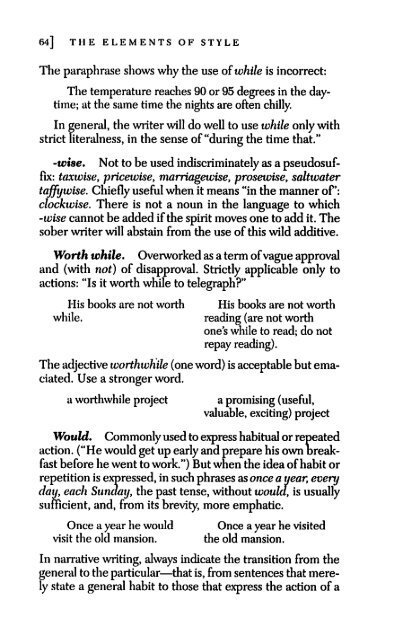You also want an ePaper? Increase the reach of your titles
YUMPU automatically turns print PDFs into web optimized ePapers that Google loves.
6 4 ] T H E E L E M E N T S O F S T Y L E<br />
<strong>The</strong> paraphrase shows why the use of while is incorrect:<br />
<strong>The</strong> temperature reaches 90 or 95 degrees in the day<br />
time; at the same time the nights are often chilly.<br />
In general, the writer will do well to use while only with<br />
strict literalness, in the sense of "during the time that."<br />
-wise. Not to be used indiscriminately as a pseudosuffix:<br />
taxwise, pricewise, marriagewise, prosewise, saltwater<br />
taffywise. Chiefly useful when it means "in the manner of:<br />
clockwise. <strong>The</strong>re is not a noun in the language to which<br />
-wise cannot be added if the spirit moves one to add it. <strong>The</strong><br />
sober writer will abstain from the use of this wild additive.<br />
Worth while. Overworked as a term of vague approval<br />
and (with not) of disapproval. Strictly applicable only to<br />
actions: "Is it worth while to telegraph?"<br />
His books are not worth His books are not worth<br />
w h i l e . r e a d i n g ( a r e n o t w o r t h<br />
one's while to read; do not<br />
repay reading).<br />
<strong>The</strong> adjective worthwhile (one word) is acceptable but ema<br />
ciated. Use a stronger word.<br />
a worthwhile project a promising (useful,<br />
valuable, exciting) project<br />
Would. Commonly used to express habitual or repeated<br />
action. ("He would get up early and prepare his own break<br />
fast before he went to work.") But when the idea of habit or<br />
repetition is expressed, in such phrases as once a year, every<br />
day, each Sunday, the past tense, without would, is usually<br />
sufficient, and, from its brevity, more emphatic.<br />
Once a year he would Once a year he visited<br />
visit the old mansion. the old mansion.<br />
In narrative writing, always indicate the transition from the<br />
general to the particular—that is, from sentences that mere<br />
ly state a general habit to those that express the action of a


